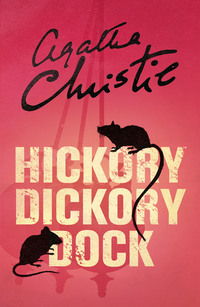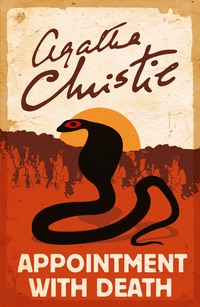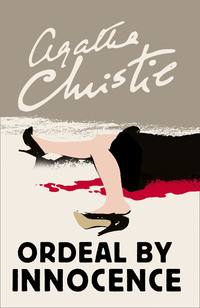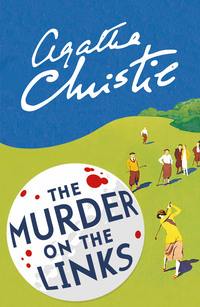‘Then you think it can happen?’
‘I don’t know enough about the subject to judge. What put it into your head? Is your new masterpiece to be Murder by Suggestion?’
‘No, indeed. Good old-fashioned rat poison or arsenic is good enough for me. Or the reliable blunt instrument. Not firearms if possible. Firearms are so tricky. But you didn’t come here to talk to me about my books.’
‘Frankly no—The fact is that my cousin Rhoda Despard has got a church fête and—’
‘Never again!’ said Mrs Oliver. ‘You know what happened last time? I arranged a Murder Hunt, and the first thing that happened was a real corpse. I’ve never quite got over it!’
‘It’s not a Murder Hunt. All you’d have to do would be to sit in a tent and sign your own books—at five bob a time.’
‘We-e-l-l-l,’ said Mrs Oliver doubtfully. ‘That might be all right. I shouldn’t have to open the fête? Or say silly things? Or have to wear a hat?’
None of these things, I assured her, would be required of her.
‘And it would only be for an hour or two,’ I said coaxingly. ‘After that, there’ll be a cricket match—no, I suppose not this time of year. Children dancing, perhaps. Or a fancy dress competition—’
Mrs Oliver interrupted me with a wild scream.
‘That’s it,’ she cried. ‘A cricket ball! Of course! He sees it from the window … rising up in the air … and it distracts him—and so he never mentions the cockatoo! What a good thing you came, Mark. You’ve been wonderful.’
‘I don’t quite see—’
‘Perhaps not, but I do,’ said Mrs Oliver. ‘It’s all rather complicated, and I don’t want to waste time explaining. Nice as it’s been to see you, what I’d really like you to do now is to go away. At once.’
‘Certainly. About the fête—’
‘I’ll think about it. Don’t worry me now. Now where on earth did I put my spectacles? Really, the way things just disappear …’
CHAPTER 2
Mrs Gerahty opened the door of the presbytery in her usual sharp pouncing style. It was less like answering a bell, than a triumphant manoeuvre expressing the sentiment ‘I’ve caught you this time!’
‘Well now, and what would you be wanting?’ she demanded belligerently.
There was a boy on the doorstep, a very negligible looking boy—a boy not easily noticeable nor easily remembered—a boy like a lot of other boys. He sniffed because he had a cold in his head.
‘Is this the priest’s place?’
‘Is it Father Gorman you’re wanting?’
‘He’s wanted,’ said the boy.
‘Who wants him and where and what for?’
‘Benthall Street. Twenty-three. Woman as says she’s dying. Mrs Coppins sent me. This is a Carthlick place all right, isn’t it? Woman says the vicar won’t do.’
Mrs Gerahty reassured him on this essential point, told him to stop where he was and retired into the presbytery. Some three minutes later a tall elderly priest came out carrying a small leather case in his hand.
‘I’m Father Gorman,’ he said. ‘Benthall Street? That’s round by the railway yards, isn’t it?’
‘’Sright. Not more than a step, it isn’t.’
They set out together, the priest walking with a free striding step.
‘Mrs—Coppins, did you say? Is that the name?’
‘She’s the one what owns the house. Lets rooms, she does. It’s one of the lodgers wants you. Name of Davis, I think.’
‘Davis. I wonder now. I don’t remember—’
‘She’s one of you all right. Carthlick, I mean. Said as no vicar would do.’
The priest nodded. They came to Benthall Street in a very short time. The boy indicated a tall dingy house in a row of other tall dingy houses.
‘That’s it.’
‘Aren’t you coming in?’
‘I don’t belong. Mrs C. give me a bob to take the message.’
‘I see. What’s your name?’
‘Mike Potter.’
‘Thank you, Mike.’
‘You’re welcome,’ said Mike, and went off whistling. The imminence of death for someone else did not affect him.
The door of No. 23 opened and Mrs Coppins, a large red-faced woman, stood on the threshold and welcomed the visitor with enthusiasm.
‘Come in, come in. She’s bad, I’d say. Ought to be in hospital, not here. I’ve rung up, but goodness knows when anybody will come nowadays. Six hours my sister’s husband had to wait when he broke his leg. Disgraceful, I call it. Health Service, indeed! Take your money and when you want them where are they?’
She was preceding the priest up the narrow stairs as she talked.
‘What’s the matter with her?’
‘’Flu’s what she’s had. Seemed better. Went out too soon I’d say. Anyway she comes in last night looking like death. Took to her bed. Wouldn’t eat anything. Didn’t want a doctor. This morning I could see she was in a raging fever. Gone to her lungs.’
‘Pneumonia?’
Mrs Coppins, out of breath by now, made a noise like a steam engine, which seemed to signify assent. She flung open a door, stood aside to let Father Gorman go in, said over his shoulder: ‘Here’s the Reverend for you. Now you’ll be all right!’ in a spuriously cheerful way, and retired.
Father Gorman advanced. The room, furnished with old-fashioned Victorian furniture, was clean and neat. In the bed near the window a woman turned her head feebly. That she was very ill, the priest saw at once.
‘You’ve come … There isn’t much time—’ she spoke between panting breaths. ‘… Wickedness … such wickedness … I must … I must … I can’t die like this … Confess—confess—my sin—grievous—grievous …’ the eyes wandered … half closed …
A rambling monotone of words came from her lips.
Father Gorman came to the bed. He spoke as he had spoken so often—so very often. Words of authority—of reassurance … the words of his calling and of his belief. Peace came into the room … The agony went out of the tortured eyes …
Then, as the priest ended his ministry, the dying woman spoke again.
‘Stopped … It must be stopped … You will …’
The priest spoke with reassuring authority.
‘I will do what is necessary. You can trust me …’
A doctor and an ambulance arrived simultaneously a little later. Mrs Coppins received them with gloomy triumph.
‘Too late as usual!’ she said. ‘She’s gone …’
Father Gorman walked back through the gathering twilight. There would be fog tonight, it was growing denser rapidly. He paused for a moment, frowning. Such a fantastic extraordinary story … How much of it was born of delirium and high fever? Some of it was true, of course—but how much? Anyway it was important to make a note of certain names whilst they were fresh in his memory. The St Francis Guild would be assembled when he got back. He turned abruptly into a small café, ordered a cup of coffee and sat down. He felt in the pocket of his cassock. Ah, Mrs Gerahty—he’d asked her to mend the lining. As usual, she hadn’t! His notebook and a loose pencil and the few coins he carried about him, had gone through to the lining. He prised up a coin or two and the pencil, but the notebook was too difficult. The coffee came, and he asked if he could have a piece of paper.
‘This do you?’
It was a torn paper bag. Father Gorman nodded and took it. He began to write—the names—it was important not to forget the names. Names were the sort of thing he did forget …
The café door opened and three young lads in Edwardian dress came in and sat down noisily.
Father Gorman finished his memorandum. He folded up the scrap of paper and was about to shove it into his pocket when he remembered the hole. He did what he had often done before, pressed the folded scrap down into his shoe.
A man came in quietly and sat down in a far corner. Father Gorman took a sip or two of the weak coffee for politeness’ sake, called for his bill, and paid. Then he got up and went out.
The man who had just come in seemed to change his mind. He looked at his watch as though he had mistaken the time, got up, and hurried out.
The fog was coming on fast. Father Gorman quickened his steps. He knew his district very well. He took a short-cut by turning down the small street which ran close by the railway. He may have been conscious of steps behind him but he thought nothing of them. Why should he?
The blow from the cosh caught him completely unaware. He heeled forward and fell …
Dr Corrigan, whistling ‘Father O’Flynn’, walked into the D.D.I.’s room and addressed Divisional Detective Inspector Lejeune in a chatty manner.
‘I’ve done your padre for you,’ he said.
‘And the result?’
‘We’ll save the technical terms for the coroner. Well and truly coshed. First blow probably killed him, but whoever it was made sure. Quite a nasty business.’
‘Yes,’ said Lejeune.
He was a sturdy man, dark haired and grey eyed. He had a misleadingly quiet manner, but his gestures were sometimes surprisingly graphic and betrayed his French Huguenot ancestry.
He said thoughtfully:
‘Nastier than would be necessary for robbery?’
‘Was it robbery?’ asked the doctor.
‘One supposes so. His pockets were turned out and the lining of his cassock ripped.’
‘They couldn’t have hoped for much,’ said Corrigan. ‘Poor as a rat, most of these parish priests.’
‘They battered his head in—to make sure,’ mused Lejeune. ‘One would like to know why.’
‘Two possible answers,’ said Corrigan. ‘One, it was done by a vicious-minded young thug, who likes violence for violence’s sake—there are plenty of them about these days, more’s the pity.’
‘And the other answer?’
The doctor shrugged his shoulders.
‘Somebody had it in for your Father Gorman. Was that likely?’
Lejeune shook his head.
‘Most unlikely. He was a popular man, well loved in the district. No enemies, as far as one can hear. And robbery’s unlikely. Unless—’
‘Unless what?’ asked Corrigan. ‘The police have a clue! Am I right?’
‘He did have something on him that wasn’t taken away. It was in his shoe, as a matter of fact.’
Corrigan whistled.
‘Sounds like a spy story.’
Lejeune smiled.
‘It’s much simpler than that. He had a hole in his pocket. Sergeant Pine talked to his housekeeper. She’s a bit of a slattern, it seems. Didn’t keep his clothes mended in the way she might have done. She admitted that, now and again, Father Gorman would thrust a paper or a letter down the inside of his shoe—to prevent it from going down into the lining of his cassock.’
‘And the killer didn’t know that?’
‘The killer never thought of that! Assuming, that is, that this piece of paper is what he may have been wanting—rather than a miserly amount of small change.’
‘What was on the paper?’
Lejeune reached into a drawer and took out a flimsy piece of creased paper.
‘Just a list of names,’ he said.
Corrigan looked at it curiously.
Ormerod
Sandford
Parkinson
Hesketh-Dubois
Shaw
Harmondsworth
Tuckerton
Corrigan?
Delafontaine?
His eyebrows rose.
‘I see I’m on the list!’
‘Do any of the names mean anything to you?’ asked the inspector.
‘None of them.’
‘And you’ve never met Father Gorman?’
‘Never.’
‘Then you won’t be able to help us much.’
‘Any ideas as to what this list means—if anything?’
Lejeune did not reply directly.
‘A boy called at Father Gorman’s about seven o’clock in the evening. Said a woman was dying and wanted the priest. Father Gorman went with him.’
‘Where to? If you know?’
‘We know. It didn’t take long to check up. Twenty-three Benthall Street. House owned by a woman named Coppins. The sick woman was a Mrs Davis. The priest got there at a quarter past seven and was with her for about half an hour. Mrs Davis died just before the ambulance arrived to take her to hospital.’
‘I see.’
‘The next we hear of Father Gorman is at Tony’s Place, a small down-at-heel café. Quite decent, nothing criminal about it, serves refreshment of poor quality and isn’t much patronised. Father Gorman asked for a cup of coffee. Then apparently he felt in his pocket, couldn’t find what he wanted and asked the proprietor, Tony, for a piece of paper. This—’ he gestured with his finger, ‘is the piece of paper.’
‘And then?’
‘When Tony brought the coffee, the priest was writing on the paper. Shortly afterwards he left, leaving his coffee practically untasted (for which I don’t blame him), having completed this list and shoved it into his shoe.’
‘Anybody else in the place?’
‘Three boys of the Teddy boy type came in and sat at one table and an elderly man came in and sat at another. The latter went away without ordering.’
‘He followed the priest?’
‘Could be. Tony didn’t notice when he went. Didn’t notice what he looked like, either. Described him as an inconspicuous type of man. Respectable. The kind of man that looks like everybody else. Medium height, he thinks, dark blue overcoat—or could be brown. Not very dark and not very fair. No reason he should have had anything to do with it. One just doesn’t know. He hasn’t come forward to say he saw the priest in Tony’s place—but it’s early days yet. We’re asking for anyone who saw Father Gorman between a quarter to eight and eight-fifteen to communicate with us. Only two people so far have responded: a woman and a chemist who had a shop nearby. I’ll be going to see them presently. His body was found at eight-fifteen by two small boys in West Street—you know it? Practically an alleyway, bounded by the railway on one side. The rest—you know.’
Corrigan nodded. He tapped the paper.
‘What’s your feeling about this?’
‘I think it’s important,’ said Lejeune.
‘The dying woman told him something and he got these names down on paper as soon as he could before he forgot them? The only thing is—would he have done that if he’d been told under seal of the confessional?’
‘It needn’t have been under a seal of secrecy,’ said Lejeune. ‘Suppose, for instance, these names have a connection of—say, blackmail—’
‘That’s your idea, is it?’
‘I haven’t any ideas yet. This is just a working hypothesis. These people were being blackmailed. The dying woman was either the blackmailer, or she knew about the blackmail. I’d say that the general idea was, repentance, confession, and a wish to make reparation as far as possible. Father Gorman assumed the responsibility.’
‘And then?’
‘Everything else is conjectural,’ said Lejeune. ‘Say it was a paying racket, and someone didn’t want it to stop paying. Someone knew Mrs Davis was dying and that she’d sent for the priest. The rest follows.’
‘I wonder now,’ said Corrigan, studying the paper again. ‘Why do you think there’s an interrogation mark after the last two names?’
‘It could be that Father Gorman wasn’t sure he’d remembered those two names correctly.’
‘It might have been Mulligan instead of Corrigan,’ agreed the doctor with a grin. ‘That’s likely enough. But I’d say that with a name like Delafontaine, either you’d remember it or you wouldn’t—if you know what I mean. It’s odd that there isn’t a single address—’ He read down the list again.
‘Parkinson—lots of Parkinsons. Sandford, not uncommon—Hesketh-Dubois—that’s a bit of a mouthful. Can’t be many of them.’
On a sudden impulse he leaned forward and took the telephone directory from the desk.
‘E to L. Let’s see. Hesketh, Mrs A … John and Co., Plumbers … Sir Isidore. Ah! here we are! Hesketh-Dubois, Lady, Forty-nine, Ellesmere Square, S.W.1. What say we just ring her up?’
‘Saying what?’
‘Inspiration will come,’ said Doctor Corrigan airily.
‘Go ahead,’ said Lejeune.
‘What?’ Corrigan stared at him.
‘I said go ahead,’ Lejeune spoke airily. ‘Don’t look so taken aback.’ He himself picked up the receiver. ‘Give me an outside line.’ He looked at Corrigan. ‘Number?’
‘Grosvenor 64578.’
Lejeune repeated it, then handed the receiver over to Corrigan.
‘Enjoy yourself,’ he said.
Faintly puzzled, Corrigan looked at him as he waited. The ringing tone continued for some time before anyone answered. Then, interspersed with heavy breathing, a woman’s voice said:
‘Grosvenor 64578.’
‘Is that Lady Hesketh-Dubois’s house?’
‘Well—well, yes—I mean—’
Doctor Corrigan ignored these uncertainties.
‘Can I speak to her, please?’
‘No, that you can’t do! Lady Hesketh-Dubois died last April.’
‘Oh!’ Startled, Dr Corrigan ignored the ‘Who is it speaking, please?’ and gently replaced the receiver.
He looked coldly at Inspector Lejeune.
‘So that’s why you were so ready to let me ring up.’
Lejeune smiled maliciously.
‘We don’t really neglect the obvious,’ he pointed out.
‘Last April,’ said Corrigan thoughtfully. ‘Five months ago. Five months since blackmail or whatever it was has failed to worry her. She didn’t commit suicide, or anything like that?’
‘No. She died of a tumour on the brain.’
‘So now we start again,’ said Corrigan, looking down at the list.
Lejeune sighed.
‘We don’t really know that list had anything to do with it,’ he pointed out. ‘It may have been just an ordinary coshing on a foggy night—and precious little hope of finding who did it unless we have a piece of luck …’
Dr Corrigan said:
‘Do you mind if I continue to concentrate on this list?’
‘Go ahead. I wish you all the luck in the world.’
‘Meaning I’m not likely to get anywhere if you haven’t! Don’t be too sure. I shall concentrate on Corrigan. Mr or Mrs or Miss Corrigan—with a big interrogation mark.’
CHAPTER 3
‘Well, really, Mr Lejeune, I don’t see what more I can tell you! I told it all before to your sergeant. I don’t know who Mrs Davis was, or where she came from. She’d been with me about six months. She paid her rent regular, and she seemed a nice quiet respectable person, and what more you expect me to say I’m sure I don’t know.’
Mrs Coppins paused for breath and looked at Lejeune with some displeasure. He gave her the gentle melancholy smile which he knew by experience was not without its effect.
‘Not that I wouldn’t be willing to help if I could,’ she amended.
‘Thank you. That’s what we need—help. Women know—they feel instinctively—so much more than a man can know.’
It was a good gambit, and it worked.
‘Ah,’ said Mrs Coppins. ‘I wish Coppins could hear you. So hoity-toity and off-hand he always was. “Saying you know things when you haven’t got anything to go on!” he’d say and snort. And nine times out of ten I was right.’
‘That’s why I’d like to hear what ideas you have about Mrs Davis. Was she—an unhappy woman, do you think?’
‘Now as to that—no, I wouldn’t say so. Businesslike. That’s what she always seemed. Methodical. As though she’d got her life planned and was acting accordingly. She had a job, I understand, with one of these consumer research associations. Going around and asking people what soap powder they used, or flour, and what they spend on their weekly budget and how it’s divided up. Of course I’ve always felt that sort of thing is snooping really—and why the Government or anyone else wants to know beats me! All you hear at the end of it is only what everybody has known perfectly well all along—but there, there’s a craze for that sort of thing nowadays. And if you’ve got to have it, I should say that poor Mrs Davis would do the job very nicely. A pleasant manner, not nosy, just businesslike and matter-of-fact.’
‘You don’t know the actual name of the firm or association that employed her?’
‘No, I don’t, I’m afraid.’
‘Did she ever mention relatives—?’
‘No. I gathered she was a widow and had lost her husband many years ago. A bit of an invalid he’d been, but she never talked much about him.’
‘She didn’t mention where she came from—what part of the country?’
‘I don’t think she was a Londoner. Came from somewhere up north, I should say.’
‘You didn’t feel there was anything—well, mysterious about her?’
Lejeune felt a doubt as he spoke. If she was a suggestible woman—But Mrs Coppins did not take advantage of the opportunity offered to her.
‘Well, I can’t say really that I did. Certainly not from anything she ever said. The only thing that perhaps might have made me wonder was her suitcase. Good quality it was, but not new. And the initials on it had been painted over. J.D.—Jessie Davis. But originally it had been J. something else. H., I think. But it might have been an A. Still, I didn’t think anything of that at the time. You can often pick up a good piece of luggage second-hand ever so cheap, and then it’s natural to get the initials altered. She hadn’t a lot of stuff—only the one case.’
Lejeune knew that. The dead woman had had curiously few personal possessions. No letters had been kept, no photographs. She had had apparently no insurance card, no bank book, no cheque book. Her clothes were of good everyday serviceable quality, nearly new.
‘She seemed quite happy?’ he asked.
‘I suppose so.’
He pounced on the faint doubtful tone in her voice.
‘You only suppose so?’
‘Well, it’s not the kind of thing you think about, is it? I should say she was nicely off, with a good job, and quite satisfied with her life. She wasn’t the bubbling over sort. But of course, when she got ill—’
‘Yes, when she got ill?’ he prompted her.
‘Vexed, she was at first. When she went down with ’flu, I mean. It would put all her schedule out, she said. Missing appointments and all that. But ’flu’s ’flu, and you can’t ignore it when it’s there. So she stopped in bed, and made herself tea on the gas ring, and took aspirin. I said why not have the doctor and she said no point in it. Nothing to do for ’flu but stay in bed and keep warm and I’d better not come near her to catch it. I did a bit of cooking for her when she got better. Hot soup and toast. And a rice pudding now and again. It got her down, of course, ’flu does—but not more than what’s usual, I’d say. It’s after the fever goes down that you get the depression—and she got that like everyone does. She sat there, by the gas fire, I remember, and said to me, “I wish one didn’t have so much time to think. I don’t like having time to think. It gets me down.”’
Lejeune continued to look deeply attentive and Mrs Coppins warmed to her theme.
‘Lent her some magazines, I did. But she didn’t seem able to keep her mind on reading. Said once, I remember, “If things aren’t all they should be, it’s better not to know about it, don’t you agree?” and I said, “That’s right, dearie.” And she said, “I don’t know—I’ve never really been sure.” And I said that was all right, then. And she said, ‘Everything I’ve done has always been perfectly straightforward and above board. I’ve nothing to reproach myself with.” And I said, “Of course you haven’t, dear.” But I did just wonder in my own mind whether in the firm that employed her there mightn’t have been some funny business with the accounts maybe, and she’d got wind of it—but had felt it wasn’t really her business.’
‘Possible,’ agreed Lejeune.
‘Anyway, she got well again—or nearly so, and went back to work. I told her it was too soon. Give yourself another day or two, I said. And there, how right I was! Come back the second evening, she did, and I could see at once she’d got a high fever. Couldn’t hardly climb the stairs. You must have the doctor, I says, but no, she wouldn’t. Worse and worse she got, all that day, her eyes glassy, and her cheeks like fire, and her breathing terrible. And the next day in the evening she said to me, hardly able to get the words out: “A priest. I must have a priest. And quickly … or it will be too late.” But it wasn’t our vicar she wanted. It had to be a Roman Catholic priest. I never knew she was a Roman, never any crucifix about or anything like that.’










